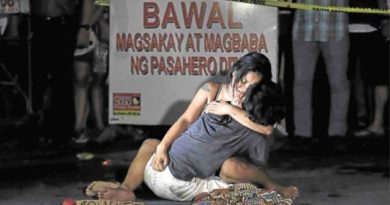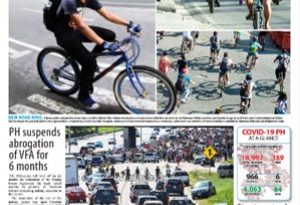OP ED COLUMN-OPINION: MANILA- The Philippines and the Summit for Democracy: How Duterte became the prodigal son
This combination photo shows President Rodrigo Duterte and US President Joe Biden./ Presidential Photo/Ace Morandante | AFP/Anna Moneymaker/Getty Images

In his speech during the virtual Summit for Democracy, President Rodrigo Duterte admitted that he was proud to be invited in this historic event to tell the world about the Philippines’ experience in democracy. He proudly proclaimed that the Philippines is the first republic in Asia and was the inspiration for many Asian anti-colonial movements.
Duterte stated that the Philippines is free as there is the freedom of expression and of the press. He asserted that his administration worked to provide the Filipino people the basic means to lead a life of dignity and this entailed creating jobs, safeguarding peace and security, and instituting social safety nets.
.
SPACE RESERVE FOR ADVERTISEMENT
/
President Duterte was also candid in admitting his failures in office such as his failed efforts to broaden democratic participation through federalism that was thwarted by the Congress’ lack of support to this political initiative. He also admitted that part of his pledge to his countrymen was to bring meaningful change but he encountered difficulties in making the necessary reforms, healing deep wounds of division, and redressing stark inequalities in the country. He also mentioned how the COVID-19 struck and unraveled many of his administration’s hard-earned gains such as economic expansion.
.
SPACE RESERVE FOR ADVERTISEMENT
/
Finally, President Duterte pungently pointed out that Philippine democracy is work in progress, as he noted that corruption, poverty and peace and order issues have also been continued to be the country’s major challenges. This is because they weakened Philippine institutions and deprived many Filipinos of democratic agencies. He concluded his speech by promising that his administration will ensure an honest, peaceful and credible elections in May 2022.
.
SPACE RESERVE FOR ADVERTISEMENT
/
Why was President Duterte invited?
Prior to the summit, the Department of Foreign Affairs (DFA) announced that the US invitation to the Philippines and President Duterte’s acceptance of the invitation demonstrated the country’s abiding commitment to democracy as manifested by the Filipinos in their hearts, minds and actions. However, not everybody was pleased when the Biden administration invited President Duterte to the summit.
Two Washington Post columnists observed that based on the US State Department’s own report, the governments of both Pakistan and the Philippines are responsible for unlawful or arbitrary killings. Another American columnist raised the question why leaders like Jair Bolsanaro of Brazil, Rodrigo Duterte of the Philippines and Narenda Modi of India were invited given their strong autocratic tendencies that have demonstrably undermined democracies in their respective countries.
Those who criticized the Biden administration for inviting President Duterte to this event overlooked a simple fact–the Summit for Democracy was convened with the US-China strategic competition in the backdrop. Confronted with growing diplomatic and military challenges from both China and Russia, one of the US’ responses are to address this traditional geopolitical challenge by forming a coalition of developed and developing democracies (or democracies at work) that can work together to safeguard their free market economies, their professional militaries, their technological innovations, and common values and institutions against two revisionist great powers.
From the Biden administration’s perspective, security priorities outweigh issues related with human rights and democratic governance. This is the rationale behind the US and the European Union’s decision to formed the US-EU Trade and Technology Council and the formation of the Quadrilateral Security Dialogue (QUAD) by Australia, India, Japan, and the US In order to ensure vital cooperation from its allies and security partners, the US needs to provide them with more political space for the respect for human rights and the adherence to democratic governance, as their significance to American strategic and diplomatic interests increases.
.
SPACE RESERVE FOR ADVERTISEMENT
/
The prodigal son
In the aftermath of the May 2016 presidential election, President Duterte made policy decisions—internal as well as external—that had serious consequences on the democratic make-up of his country as well as the geopolitical situation in the region. He overhauled the mechanism of Philippine foreign policy by veering away from the US and leaning toward China.
Duterte disclosed his plans to terminate joint Philippine-US military exercises, and long-standing alliance with Washington and to reach out to Russia. He even downplayed the Philippines’ legal victory in its territorial dispute with China over the South China Sea. Early on, President Duterte was predisposed to downgrade relations with the US and to engage in more multi-faceted interactions with Russia and China.
His efforts to pivot to China, however, suffered a series of setbacks. Promised Chinese public investment in Philippine infrastructure failed to arrive, the People Liberation Army’s (PLA’s) units deployed in the South China Sea continued to harass Armed Forces of the Philippines’ (AFP) ships and planes patrolling the disputed waters, and the Philippine public remains suspicious and wary of China in the light of its expansion in the West Philippine Sea.
On July 30, 2021, he withdrew the notice of termination for the 1999 Visiting Forces Agreement (VFA) after meeting US Defense Secretary Lloyd Austin during his official visit to the Philippines. In September 2021, Foreign Affairs Secretary Teodoro Locsin welcomed the creation by Australia, United Kingdom, and US of new security arrangement, AUKUS, claiming that it will help maintain peace and stability in Southeast Asia.
During the 9th US-ASEAN Summit in late October 2021, President Duterte declared that AUKUS will promote peace and stability in Southeast Asia and will ensure ASEAN’s centrality in the evolving regional security architecture. From the eyes of the Biden administration, these actions transformed him from an authoritarian leader to a prodigal son; thus, earning him a seat in the Summit for Democracy.
.

.
Dr. Renato Cruz de Castro is a trustee and convenor of the National Security and East Asian Affairs Program of think tank Stratbase ADR Institute.











